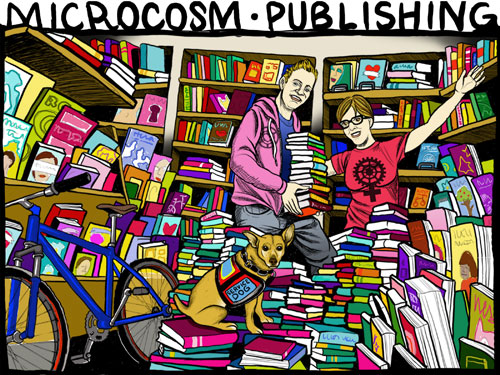Prior to attending PubWest this past February, if I heard anything about crowdfunding to publish a book, I thought “Gee, that sounds like a really illegitimate cop-out method of getting a book published.” It seemed just short of panhandling to your friends on Facebook for a vanity writing project. I figured the title of the PubWest session “Transformations on the Publishing Horizon: How Will Crowdfunding and Hybrid Authors Affect Publishing?” would be a criticism condemning the practice of publishing books via other people’s donations. How wrong I was.
The panel consisted of local author Laura Foster (author of Columbia Gorge Getaways and many other Portland and Oregon travel books); Suzanne Paschall, the ambassador of the National Crowdfunding Association of Canada; Avalon Radys, Director of Marketing and Publishing Operations at Inkshares; and Elly Blue, co-owner of Microcosm Publishing in Portland. It was quite the lineup. I left the session feeling very inspired and decided to look into the inner workings of Inkshares and Microcosm more deeply.
In a nutshell, here’s a breakdown of how Inkshares and Microcosm work. Inkshares is an audience-curated book publisher based in Oakland, California. Avalon Radys described the process thusly: “When interested in getting published through Inkshares an author comes to our site and launches a campaign to accept pre-order. If they reach the pre-order threshold of 750 copies we publish the book. Alternatively, we run contests with ‘imprints’ (brands like Legendary Entertainment) and publish the top three performing books in a contest dependent on the highest number of unique readers (not pre-orders).” One of their most popular titles, the marijuana cookbook Herb, had exceeded sales of 15,745 units in February 2017 since its pub date of November 2015. The success of each project weighs heavily on the author(s) having a strong, stable, and intact reputation as well as a social media presence and following. The subject of the book also needs to possess a strong niche following (conservation, cannabis culture, Trekkie culture, “weird sci-fi,” etc.). Check out more about Inkshares on their website.
Microcosm publishers Elly Blue and Joe Biel start crowdfunding campaigns for books and zines that possess a clear niche-following. In other words, the book has to fill a very special space on a very specific topic, or as Elly Blue put it, “It fits with a market that is the niche-ist niche that ever niched.” Since 2010, Microcosm has successfully used Kickstarter to raise over $100,000 for twenty-five books and zines. For Microcosm, crowdfunding is not a litmus test to decide whether a book is worthy of publication; each book is thoroughly researched prior to the crowdfunding process. Microcosm uses crowdfunding as a way to bolster a book’s audience and lighten production costs. For a complete list of their titles, visit Microcosm Publishing.
In addition to Kickstarter, the most frequently used crowdfunding platforms include Patreon, Indiegogo, FundRazr, Publaunch, Unbound, and Publishizer. Crowdfunded publishing or “authorpreneurship” is clearly changing the game of publishing for both publishers and writers.

